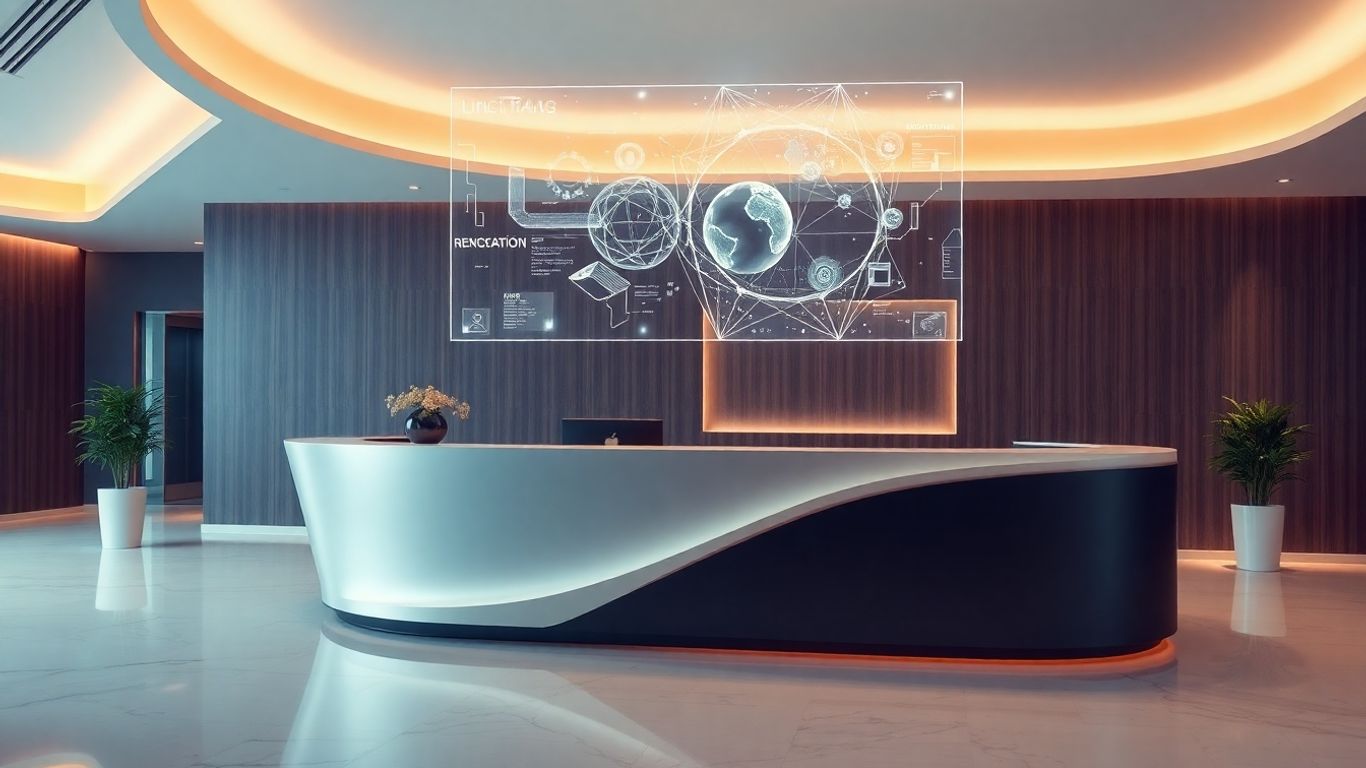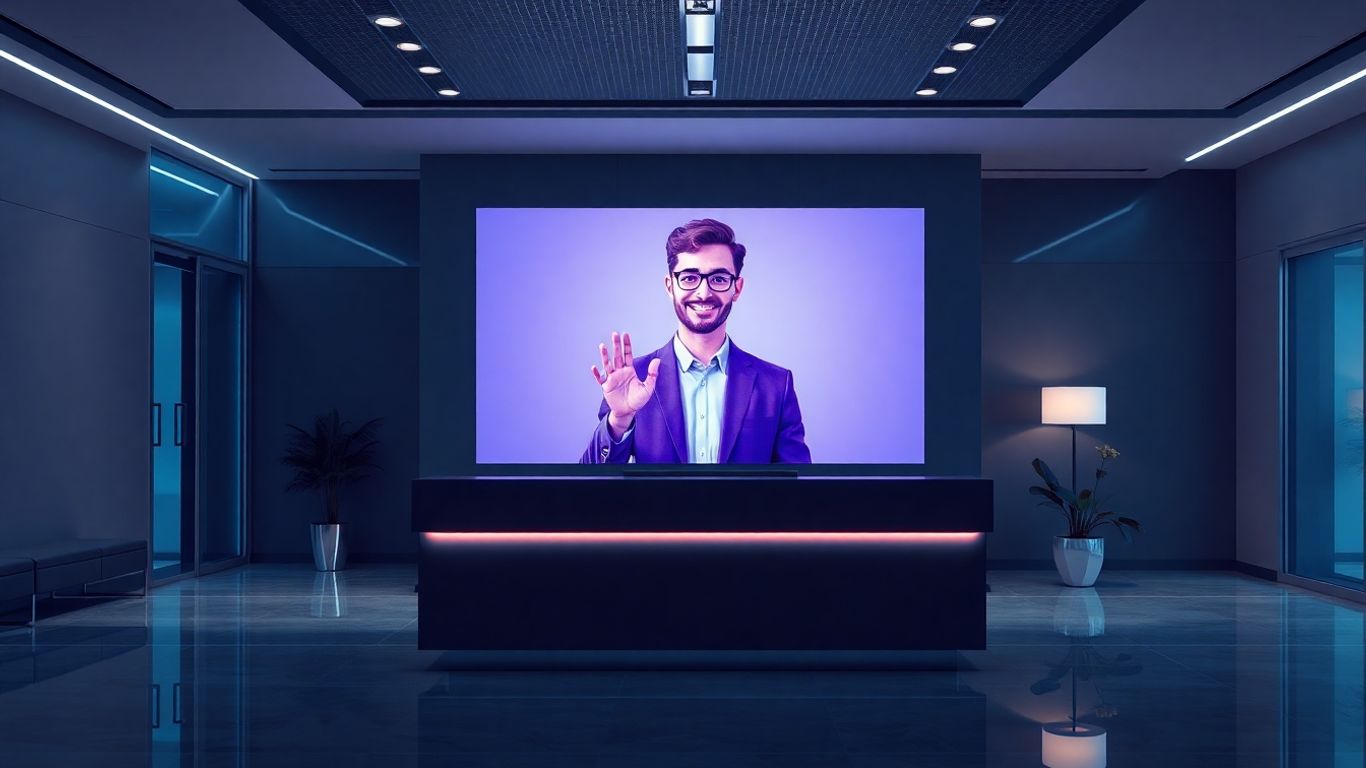So, you're looking to upgrade your office's front desk game, right? It feels like every week there's some new tech promising to make your life easier. This time, it's all about AI receptionists. These aren't your grandma's answering machines; they're smart, fast, and can handle a surprising amount of work. We're talking about finding the leading AI-powered receptionist alternatives for modern offices that can actually make a difference. Let's see what's out there and if it's worth the hype.

It feels like everywhere you look these days, there's talk about AI. And for good reason. In the world of running an office, AI receptionists are really starting to make waves. Think about all those little tasks that eat up time – answering phones, directing calls, maybe even booking appointments. For years, that was the job of a person, right? But now, technology can handle a lot of that, and honestly, it's pretty impressive.
This is where AI receptionists really shine. They can take over a bunch of the day-to-day administrative stuff that, let's be honest, can get pretty repetitive. Instead of someone sitting at a desk fielding calls, an AI can do it. It's not just about answering the phone, either. It's about making sure the call gets to the right person or department quickly. This frees up your human staff to focus on things that really need their attention, like solving complex problems or talking to clients who need a more personal touch.
Remember calling a business and getting put on hold forever, or worse, getting a busy signal? AI receptionists can help put an end to that. They're available 24/7, so customers can get answers or assistance whenever they need it, not just during business hours. Plus, they respond super fast, usually in milliseconds. This means conversations feel more natural and less frustrating for the customer. It’s like having a super-efficient, always-on assistant who never gets tired or has an off day.
The goal here isn't to replace humans entirely, but to handle the predictable, routine interactions so that human employees can focus on the more complex and relationship-building aspects of their jobs. It's about making the whole system work better for everyone involved.
Let's talk about the bottom line. Hiring and maintaining a full-time receptionist or front desk staff can be a significant expense, especially for smaller businesses. AI receptionists offer a way to get that coverage without the high overhead. You're not paying for benefits, breaks, or office space for an AI. This can lead to some serious savings, allowing businesses to reinvest that money into other areas. It’s a smart way to manage resources and keep operations lean.
When you're looking at AI receptionists, it's not just about having something answer the phone. These systems come packed with features that can really change how your business runs. Think about what you need most – maybe it's always being available, or making sure calls go to the right person. These tools are built to handle a lot.
This is a big one. Your AI receptionist doesn't sleep, take breaks, or call in sick. It's there all the time, ready to help customers whenever they reach out. This means no more missed calls or frustrated customers trying to get through after hours. The response time is also incredibly fast, often measured in milliseconds. It feels natural, like you're talking to someone who's really paying attention, not a robot stuck on a delay.
These AI systems are smart. They can figure out what a caller needs based on what they say. Instead of just a basic menu, the AI can understand the intent behind the call and send it to the right department or person. This saves everyone time and makes sure the caller gets to the right place without bouncing around.
Forget the back-and-forth emails or phone tag to book a meeting. AI receptionists can connect directly to your calendar and handle appointment setting. They can find available slots, book them, and even send confirmations. This frees up your staff and makes it super easy for clients to schedule time with you.
Even with all this automation, sometimes calls still end up in voicemail. AI receptionists can manage this too. They can take messages, and more importantly, transcribe them into text. This means you can quickly read your voicemails instead of listening to them, making it easier to sort through and respond to important messages without missing a beat.

Making sure your new AI receptionist plays nice with the tools you already use is a big deal. It’s not just about answering calls; it’s about making your whole operation run smoother. Think about it: when your AI can talk to your CRM, schedule appointments directly into your calendar, or even update your project management software, it’s like giving your business a central nervous system. This means less manual data entry, fewer mistakes, and more time for your team to focus on actual work.
Many of these AI receptionists can connect with thousands of other applications, often through platforms like Zapier. This isn't just a small perk; it's a way to automate entire workflows. For instance, when a call ends, the AI could automatically update a lead's status in your CRM, create a follow-up task, or send a notification to the right person. It’s about making sure information flows freely and actions happen automatically, without anyone needing to lift a finger.
Here’s a look at what that integration can mean:
The real power comes when your AI receptionist isn't just a standalone tool but a connected part of your business ecosystem. It transforms from a simple answering service into an active participant in your daily operations, automating tasks that used to eat up valuable time.
This level of integration means your business can operate more efficiently, with less manual work and a more connected flow of information. It’s about making your technology work for you, not the other way around.
Think about how much time gets wasted when your phone system doesn't know when to actually work. It's like having a receptionist who sleeps through important meetings. With AI receptionists, you get to tell them exactly when to be on duty. You can set specific hours for weekdays, weekends, or even special holidays. This means your AI won't be answering calls when you're closed, which is pretty handy. It just knows when to pick up and when to let calls go to voicemail or forward them. It’s about making sure the AI works when you want it to, not just all the time. This way, you avoid those awkward "we're closed" messages during normal business hours.
Sometimes, you just need to keep an eye on how much you're using a service, especially if costs are a concern. Many AI receptionist services let you set limits on how many minutes the AI can talk for each day, week, or month. It’s like putting a cap on your phone bill before it gets out of hand. You can also set up alerts that let you know when you're getting close to that limit. This is great for managing your budget and making sure you don't get any surprise charges. It gives you a lot of control over your spending and how the AI is used.
Want your AI receptionist to sound like it's part of your company, not some generic service? You can often customize the AI's voice, name, and even the greeting it uses. Some services go a step further and offer white-labeling. This means you can put your own company's branding on the AI receptionist service and offer it to your own clients. It’s a way to provide a high-tech service under your own brand name, which can be a real business booster if you're an agency or a consultant. It makes the whole experience feel more personal and professional for your customers.
Remember when businesses used to worry about phone lines being busy? Those days are pretty much over. AI receptionists can handle all incoming calls at the same time, without any limits. This means no more missed calls or busy signals, making sure every customer gets through.
Speed matters in conversations, and AI receptionists respond in milliseconds, keeping up with natural conversation flow. This quick response time turns potentially frustrating interactions into smooth, natural conversations, making customers feel like they're talking to someone really competent.
Think about the last time you called a business and got a slow, robotic response. It’s pretty annoying, right? AI aims to eliminate that. It doesn't just answer quickly; it processes information quickly too. You can ask it a complex question, and it doesn't miss a beat. It's like talking to the smartest person you know, but one who never needs a moment to think.
This speed isn't just a cool feature; it really changes how customers experience your business. It’s the difference between feeling like you're talking to a machine and feeling like you're talking to a helpful human.
Here’s a quick look at what makes AI communication so efficient:
The ability of AI to handle an unlimited number of calls at once is a significant advantage. It means that during peak times or unexpected surges in customer contact, your business can still provide immediate attention to every caller, preventing lost opportunities and maintaining a positive customer experience.

Think about all those potential customers who call your business. Are you really making the most of those interactions? AI receptionists can step in here, acting as your first line of defense for sales. They're not just answering phones; they're actively working to figure out who's serious about buying and who's just browsing.
This is where AI really shines for sales. Instead of your sales team spending hours on the phone making cold calls, an AI can handle it. You can set up campaigns to reach out to lists of potential leads automatically. The AI can make the calls, deliver a message, and even handle basic responses. This frees up your human sales reps to focus on the leads that the AI has already identified as being more promising.
Once the AI connects with a potential lead, it can start asking questions. You get to decide exactly what those questions are. Want to know their budget? Their timeline? Their specific needs? The AI can ask these questions in a natural-sounding way. Based on the answers, it can then decide if the lead is a good fit for your business. This means your sales team only talks to people who are genuinely interested and likely to buy.
AI can ask a series of questions to gauge interest and fit, filtering out those who aren't a good match before they even reach a human salesperson.
It's not enough to just make the calls and ask questions. You need to know what's working. AI systems provide detailed reports on call performance. You can see how many calls were made, how many leads were qualified, what questions led to the best results, and more. This data is super helpful for tweaking your sales strategy and improving your AI's effectiveness over time. You can track things like:
This kind of insight helps you understand your sales funnel better and make smarter decisions about where to invest your time and resources.
So, you're trying to figure out if an AI receptionist is the right move for your business, or if you should stick with a human touch. It's a big decision, and honestly, there's no single right answer. It really depends on what you need.
AI receptionists are fantastic for handling the day-to-day, repetitive tasks that can bog down your team. Think about answering common questions, scheduling basic appointments, or even qualifying initial leads. They're always on, 24/7, and they don't get tired or need breaks. This means your business can be accessible around the clock, which is a huge plus for customer satisfaction and not missing out on potential business, especially if you have clients in different time zones.
Live receptionists, on the other hand, bring something AI can't quite replicate yet: genuine empathy and the ability to handle really complex, nuanced, or emotionally charged conversations. If your business deals with sensitive information, requires a lot of personal interaction, or if your clients often have unique, out-of-the-box issues, a human agent can be invaluable. They can read between the lines, offer comfort, and build rapport in a way that current AI technology still struggles with.
Here's a quick breakdown to help you decide:
Many businesses find that a hybrid approach works best. You can use AI for the bulk of routine inquiries and appointment setting, and then have live agents step in for more complex issues or when a personal touch is really needed. This way, you get the efficiency and availability of AI, combined with the nuanced understanding and personal connection that only a human can provide. It's about finding that sweet spot where technology supports your team and improves your customer experience without losing the human element entirely.
Ultimately, the choice comes down to your business's specific needs, budget, and the type of customer experience you want to create. Evaluating your call volume, the complexity of typical inquiries, and your budget for staffing will guide you toward the best solution, whether that's pure AI, live agents, or a smart combination of both.
It’s one thing to talk about how great AI receptionists are in theory, but it’s another to see them actually working for businesses. And let me tell you, the results are pretty impressive.
Think about a small retail shop. Before AI, maybe the owner or a single employee was trying to answer phones, help customers in the store, and manage inventory. It’s a lot. But when they brought in an AI receptionist, things changed. This AI handled all the basic questions – store hours, return policies, that sort of thing. Suddenly, the staff had more time to actually help people on the floor. One store saw customer happiness jump by a solid 60% after making the switch. It’s not just about answering calls; it’s about freeing up people to do the jobs that really need a human touch.
Now, let’s look at bigger companies. Imagine a large corporation that used to have a whole team just for answering phones. When they brought in an AI receptionist, they managed to cut their operational costs by about 30%. That’s a big chunk of change. Not only that, but their response times got faster by 50%. How? The AI could handle tons of calls all at once, so nobody was stuck on hold forever. It’s like giving your whole customer service department a turbo boost.
We’ve seen this happen in healthcare too. A medical practice started using AI receptionists, and it made a huge difference. They weren't just answering calls; the AI was helping schedule appointments and even doing things like remote patient check-ins. The outcome? Patient satisfaction went up by 40%. Plus, fewer people missed their appointments, which is a win-win for everyone. It seems like when you make things easier and faster for customers, they notice and appreciate it.
The real magic happens when AI takes over the repetitive, predictable tasks, allowing human employees to focus on complex problem-solving and building deeper customer relationships. This shift not only boosts efficiency but also creates a more engaging work environment.
So, you're thinking about bringing an AI receptionist into your business. That's a smart move, but with so many options out there, picking the right one can feel a bit overwhelming. It's not just about finding something that answers the phone; it's about finding a tool that actually fits how you work. Let's break down what you really need to look at.
This is a big one. Your AI receptionist shouldn't be a standalone gadget. It needs to play nice with the other software you're already using. Think about your CRM, your scheduling tools, your email marketing platform – basically, anything that keeps your business running. A good AI receptionist will connect with these, often through services like Zapier, which can link up with thousands of other apps. This means when a new lead comes in, the AI can automatically add them to your CRM, or when an appointment is booked, it can update your calendar. The goal is to make your systems talk to each other, saving you tons of manual data entry and preventing those annoying mix-ups.
Here are some common integrations to look for:
When you're looking at AI receptionists, think about what happens if something goes wrong. Is there a human you can talk to if the AI gets confused or if you need to make a complex change? Also, consider how the service grows with you. If your business suddenly gets a lot busier, can the AI handle the increased call volume without breaking a sweat? You want a system that can scale up easily, maybe by handling more calls simultaneously or by offering more advanced features as your needs change. It’s not just about having an AI that works today, but one that will keep working as your business expands.
The best AI receptionists are built with flexibility in mind. They should adapt to your business's rhythm, not the other way around. This means being able to adjust settings, add new information, and scale resources without a massive headache.
Pricing can vary a lot. Some services charge a flat monthly fee, while others might charge based on usage – like the number of minutes the AI is active or the number of calls it handles. You might also see tiered plans that offer different sets of features. It’s really important to understand what’s included in each tier and how the pricing works before you commit. Don't just look at the lowest price; consider the value and features you're getting. A slightly more expensive option might save you money in the long run if it integrates better or offers more robust features that you actually need. Always check for any hidden fees or setup costs, too.

It’s pretty clear that AI isn't just a passing trend; it's fundamentally changing how we run our offices. Looking ahead, the integration of AI into daily operations promises even more significant shifts, making things smoother and smarter.
AI systems are built to get better over time. They learn from every interaction, every piece of data. This means they can spot patterns and trends that we might miss, helping businesses make sharper decisions. Think of it like having a super-attentive assistant who's always studying your business to find ways to improve.
The real magic happens when AI starts talking to other new tech. Imagine AI working with smart office sensors (IoT) to automatically adjust lights and temperature, or using blockchain for more secure record-keeping. This kind of teamwork between different technologies will create office environments that are not only efficient but also really secure.
By taking over routine tasks and providing deep insights, AI opens doors to entirely new ways of doing business. AI can handle customer questions, book appointments, and even keep track of inventory. This frees up people to focus on creative work and new ideas. Businesses can even start offering new services based on what their AI can do, which is a pretty exciting prospect for growth.
The ongoing development of AI means that what seems advanced today will likely be standard practice tomorrow. Businesses that embrace these changes now will be best positioned to adapt and thrive in the evolving landscape of office management.
Here’s a quick look at how AI is already making a difference:
It’s not just about keeping up; it’s about getting ahead and finding new ways to work smarter.
Imagine a world where your office tasks are handled automatically. AI is making this a reality, changing how businesses operate. From managing schedules to answering questions, AI tools can help your office run smoother than ever. Want to see how this smart technology can help your business? Visit our website to learn more and get started!
So, we've looked at a bunch of ways AI can step in and handle the front desk duties. It's pretty clear these tools aren't just a passing trend. They can answer questions, book appointments, and basically keep things running smoothly, even when you're not around. For businesses trying to save time and maybe a bit of money, it's definitely something to think about. It seems like a smart move to at least check out what these AI receptionists can do for your specific setup. The technology is here, and it's ready to help.
An AI receptionist can handle many tasks that a human receptionist does. This includes answering calls, scheduling appointments, answering common questions about your business, and even taking messages. It's like having a virtual assistant that's always available.
These AI receptionists are super fast! They can reply in just milliseconds, which is fast enough to keep up with a normal conversation. This means customers don't have to wait around for a response, making the experience much smoother.
Yes, absolutely! AI receptionists can handle an unlimited number of calls at the same time. This is great for busy businesses because no one gets put on hold or hears a busy signal. It ensures every customer can get through.
That's one of the best parts! AI receptionists are available 24/7. They can answer calls and help customers even when your office is closed, on weekends, or during holidays. It means you never miss a chance to connect with a customer.
You sure can! You can customize the AI receptionist to match your company's style and brand. You can even set specific times when it should be active, like during your business hours, and tell it how to handle calls during holidays or different time zones.
By taking care of many routine tasks, an AI receptionist can lower your business costs. You might not need as many human staff for basic call handling, and the AI works non-stop without needing breaks, which can be much cheaper than hiring more people.
Yes, many AI receptionists can connect with thousands of other apps, like your calendar or customer management software, using tools like Zapier. This means information can flow back and forth automatically, making your work much easier and keeping everything up-to-date.
Human receptionists are great for complex or sensitive conversations where empathy is key. AI receptionists are perfect for handling a high volume of simple, repetitive tasks quickly and consistently, 24/7, and at a lower cost. Many businesses use a mix of both for the best results.
Start your free trial for My AI Front Desk today, it takes minutes to setup!








